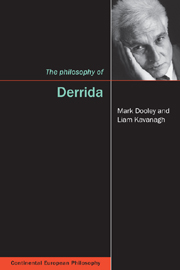Book contents
- Frontmatter
- Contents
- Preface
- Abbreviations
- 1 The catastrophe of memory: identity and mourning
- 2 Death and différance: philosophy and language
- 3 Repetition and post cards: psychoanalysis and phenomenology
- 4 The risks of negotiation: ethics and politics
- Afterword
- Notes
- Suggestions for further reading
- References
- Index
2 - Death and différance: philosophy and language
- Frontmatter
- Contents
- Preface
- Abbreviations
- 1 The catastrophe of memory: identity and mourning
- 2 Death and différance: philosophy and language
- 3 Repetition and post cards: psychoanalysis and phenomenology
- 4 The risks of negotiation: ethics and politics
- Afterword
- Notes
- Suggestions for further reading
- References
- Index
Summary
Derrida is primarily a philosopher of language. He devoted his entire career to demonstrating how all of our experience is mediated by language, writing and textuality. We can never have access to any kind of experience that would not already be structured by language. The only way we can comprehend anything at all is if we can conceptualize it to some degree. But what does this have to do with memory? Historical memory, the desire to recollect and preserve the past, is only possible by means of texts and documents, monuments and archives, all of which are forms of what Derrida means by writing. If there were no writing, there would be no history and no possibility of memory. But writing is always partial and incomplete; it is composed of multifarious marks and traces, and can always function in the absence of an original event or “presence”. It is precisely because memory is inseparable from writing that memory itself is fragmentary and incomplete.
Derrida is critical of the philosophical tradition that attempts to efface the necessity of writing from identity and historical memory. This tradition always attempts to think identity in terms of a teleology of memory. By teleology, Derrida means the attempt to recover and recollect a determinate end (telos). This “end” is the conviction that eventually everything can be recollected, that the past can be gathered into a harmonious whole.
- Type
- Chapter
- Information
- The Philosophy of Derrida , pp. 21 - 66Publisher: Acumen PublishingPrint publication year: 2006

